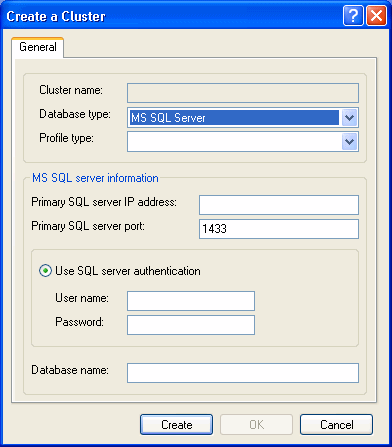|
• |
Servers (HostFront Servers or BlueZone Access Server servers) |
|
• |
Cluster Services (HostFront Cluster Services or BlueZone Access Server Cluster Services) |
|
• |
A MS SQL database engine to hold the configuration information (profile) |
|
• |
Cluster profile in the database |
The Host Access Manager (HAM) first connects with the (MSDE) database server to create a profile and thereafter to access
it and manage its information. You create a cluster profile only once after the first installation. However, you can install
HAM on multiple computers and then connect to the profile database by adding the cluster database information to the local
HAM.
By adding the cluster database information to HAM on your computer, the information can be saved on the local computer so
that next time you start HAM from that computer, it will be available for you (note the you still have to sign on to the cluster
every time you want to connect to it).
After starting HAM for the first time, you must create the cluster profile in the database. You can create a cluster database
by doing one of the following while selecting the Host Access Manager node in the left pane:
|
• |
Right-click the Host Access Manager item in the left pane and select Create a Cluster.
|
|
• |
Select Create a cluster from the New button in the toolbar.
|
The following dialog box opens:
Fill in the database server IP address and authentication credentials. You also need to provide a name for the new cluster
you are creating.
|
1. |
Database type: You have currently one option for this list, and that is MS SQL Server. |
|
2. |
Profile Type: Select from this list the product type you have installed (BlueZone Access Server or HostFront). |
|
3. |
Primary SQL Server IP address: The IP address of the database server. |
|
4. |
Primary SQL Server port: The port of the SQL server. The default value for MS SQL server is 1433 unless manually changed by you in the Servers Tab.
If your SQL server is using a port that is different from the default 1433, make sure to enter the correct value. |
|
5. |
Use SQL server authentication: Select this option to use a normal use rname/password for authentication on the SQL server. Enter the user name and password
in the appropriate fields. |
|
6. |
Database name: Provide the name of the cluster. Take note of this name as you will need later on to connect to the cluster database from
other computers where you install the HAM. |
|
7. |
When you have finished entering information, click Create. This runs a script which creates the database structure required to hold the HostFront configuration profile. When the script
is finished, you can connect to the new database by clicking the OK button. You will be prompted to sign on to the cluster.
To sign on use:
|
• |
Username: Administrator
|
|
• |
Password: hfem (case sensitive)
|
You are now ready to start configuring and managing the cluster.
|
You use the above step only once when you create the cluster. After that, you can manage the cluster definition on the computer
where you are running the Host Access Manager.
